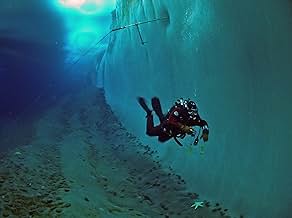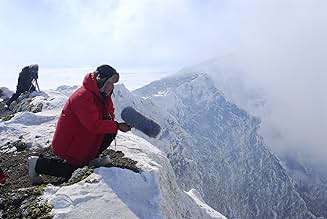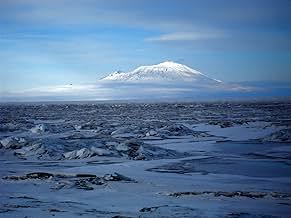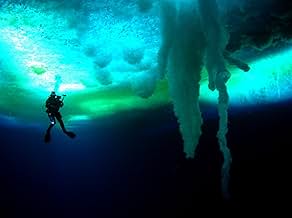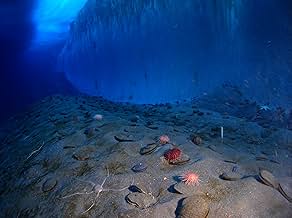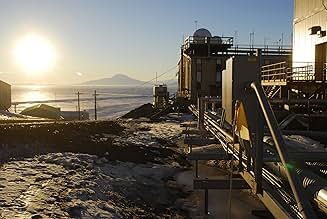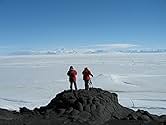Unisciti a Werner Herzog in viaggio verso la stazione McMurdo in Antartide, cercando di catturare la bellezza del continente e indagare sui personaggi che vivono lì.Unisciti a Werner Herzog in viaggio verso la stazione McMurdo in Antartide, cercando di catturare la bellezza del continente e indagare sui personaggi che vivono lì.Unisciti a Werner Herzog in viaggio verso la stazione McMurdo in Antartide, cercando di catturare la bellezza del continente e indagare sui personaggi che vivono lì.
- Regia
- Sceneggiatura
- Star
- Candidato a 1 Oscar
- 2 vittorie e 16 candidature totali
- Self - Glaciologist
- (as Douglas MacAyeal)
- Self - Filmmaker, Cook
- (as Ryan A. Evans)
Recensioni in evidenza
But, the film STILL is mesmerizing. You learn about the very unearthly sort of sounds the seals make under the ice, the sad story of a mixed-up penguin, some amazing volcano research and lots of odd facts about this MOSTLY desolate continent. Well worth seeing--just don't be too turned off by the occasionally bizarre dialog.
Almost a companion piece to Herzog's earlier poem-like Fata Morgana, the film brings us into a world hidden to almost all but a very chosen few.
There are incredible exchanges between Herzog and his human subjects, who are all researchers studying various aspects of the Antarctic eco-sphere. One such exchange with a cell biologist involves the idea that humans evolved from the ocean to escape what the scientist terms the 'absolute horror' of existence among the extremely vicious, often microscopic 'monsters' that savagely fight for their existence in the frozen waters. Some of these creatures are shown in remarkable underwater photography and it's not hard to see what he means.
Another interview that I found both terrifying and fascinating was one with a journeyman plumber (who also is allegedly related to the Ancient Aztec royalty) about the effects of global warming. I didn't like 'An Inconvenient Truth' and have always been somewhat on the fence about global warming. But the way this man describes global warming set the hairs on my arms on end. The subject is returned to later in the film with several scientists advocating an even bleaker outlook on the topic. Their consensus is that we have already tipped the point of no return and that our existence as humans is already marked for extinction.
As one glacierologist, pointing at a radar screen showing formations of large glaciers puts it: "I don't want to know what happens when that melts." By the way, did you know that seal calls are like the sound of Moog synths and earlier Pink Floyd? I haven't even scratched the surface of this film. There are so many breathtaking moments of sheer rugged beauty that it will bring tears to your eyes.
Do not see this movie on video or DVD. Unlike 'Grizzly Man' which was more of a television format film, "Encounters At the End of The World" is deeply, deeply cinematic.
How many Bat-films do you need to see anyway? Do your brain a favor and lose yourself in 'Encounters at the End of The World'.
Best film of '08 hands down.
It focuses predominantly on the odd collection of people drawn to live in an Antarctic research station, and to a slightly lesser degree on the oddness of the region itself, and the bizarre bits of scientific trivia that can be found there. Then there the bonus meanderings about the ultimate doom of humanity and whether we originally emerged from the sea onto land to escape the "horror" of marine ecosystems.
Many of its parts are fascinating, but for me, it didn't quite come together as a whole. It drifted in a lot of different directions, but seemed overall to be lacking in focus a bit. There were also a couple of elements that disturbed me a little - one was the inconsistency of talking about how humanity is destroying itself one moment, and then bashing "tree huggers and whale huggers" the next. I guess it's OK to notice that we're damaging the world, but not to try and do something about it? The other was that in some cases he seemed to be going out of his way to depict the people he interviewed in embarrassing ways, with things like leaving the camera lingering on them after the interview appeared to be finished, as they stood nervously, apparently trying to figure out if it was over or not.
But on the whole I would recommend it -- the flaws are offset by some impressive visuals (especially the underwater footage), dry humour, interesting ideas to ponder, and a really great soundtrack by Henry Kaiser and David Lindley, which work very well with the oddness of the content.
My complaints are essentially twofold. First, the movie is disjointed. It is a hodgepodge of Herzog's encounters with various Antarctic researchers and residents; there is no apparent order or theme. This is a minor criticism, as most of the segments make for fine viewing on their own, but it would have been more satisfying if Herzog had presented a unifying thesis or two about the Light Continent (aside from the oft-repeated observation that it is populated by a fair number of "professional dreamers"). He should have at least arranged the segments in a clearly meaningful sequence. At its best, the film made no more of an impression on me than "that was beautiful," "that was cool," or "I didn't know that." Second, and more significantly, Herzog's narration is at times irritating. As someone who has studied climate change, I share his frustration and pessimism. But there is no call for saddling the film's final moments with apocalyptic platitudes (e.g., "the end of human life is assured") and a cursory reference to global warming. These sentiments are incongruous with the rest of the film, which does not substantially address environmentalism and whose most haunting scene is of a mad penguin that abandons its flock and runs inland towards distant mountains, to certain death, with a singular determination. Herzog's doomsayings, in any event, are better communicated by the satellite images of rapidly melting polar ice that we observe on a climatologist's computer screen. I know that Herzog is capable of more measured reflections on the impersonal and uncontrollable power of nature; for example, from Grizzly Man: "what haunts me is that in all the faces of all the bears that Treadwell ever filmed, I discover no kinship, no understanding, no mercy. I see only the overwhelming indifference of nature. To me, there is no such thing as a secret world of the bears. And this blank stare speaks only of a half-bored interest in food. But for Timothy Treadwell, this bear was a friend, a savior." In Encounters, Herzog superficially and self-indulgently overstates his case. I'm looking forward to his next film.
Lo sapevi?
- QuizWerner Herzog dedicated the film to Roger Ebert, who he calls a true "warrior of cinema". Due to the dedication Ebert could not review the film, but he wrote a complimentary letter to Herzog and later published it.
- Citazioni
[last lines]
Stefan Pashov: There is a beautiful saying by an American philosopher, Alan Watts. He used to say that through our eyes the universe is perceiving itself, and through our ears the universe is listening to its cosmic harmonies. And we are the witness to which the universe becomes conscious of its glory, of its magnificence.
- ConnessioniEdited from Assalto alla terra (1954)
- Colonne sonorePlanino Stara Planino Mari
Written by Stefan Dragostinov
Performed by The Philip Koutev National Folk Ensemble
I più visti
- How long is Encounters at the End of the World?Powered by Alexa
Dettagli
- Data di uscita
- Paese di origine
- Sito ufficiale
- Lingue
- Celebre anche come
- Encounters at the End of the World
- Luoghi delle riprese
- Aziende produttrici
- Vedi altri crediti dell’azienda su IMDbPro
Botteghino
- Lordo Stati Uniti e Canada
- 944.933 USD
- Fine settimana di apertura Stati Uniti e Canada
- 17.730 USD
- 15 giu 2008
- Lordo in tutto il mondo
- 1.205.464 USD
- Tempo di esecuzione
- 1h 39min(99 min)
- Colore
- Mix di suoni
- Proporzioni
- 1.78 : 1







